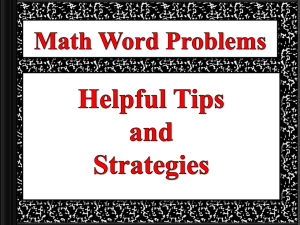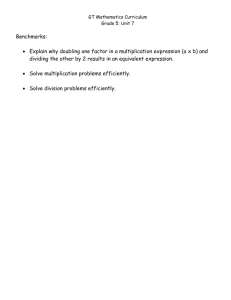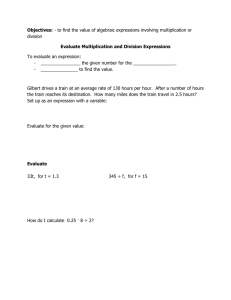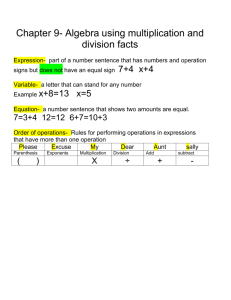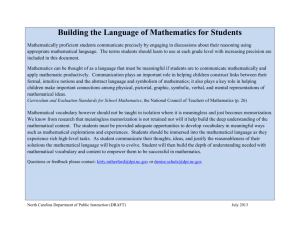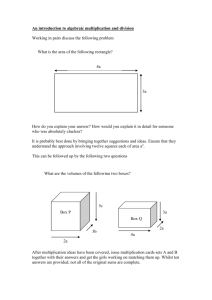Workshop Materials Focusing on Multiplication
advertisement
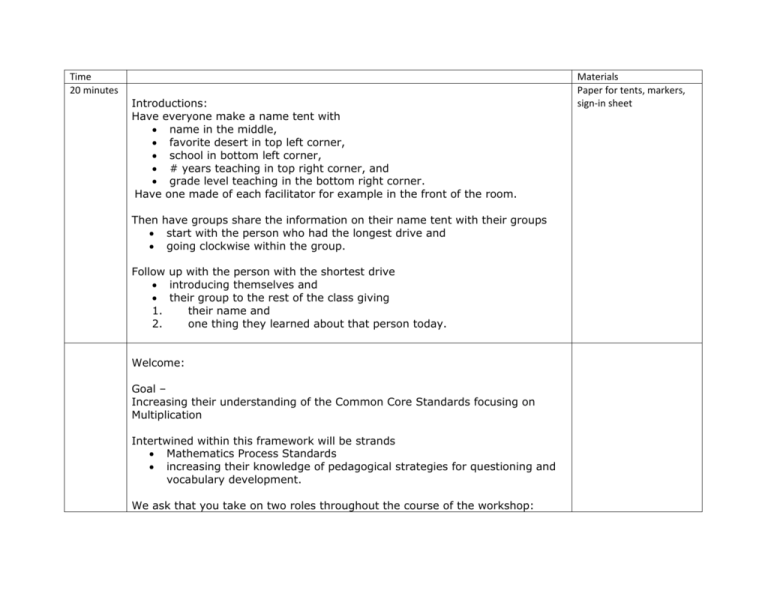
Time 20 minutes Introductions: Have everyone make a name tent with name in the middle, favorite desert in top left corner, school in bottom left corner, # years teaching in top right corner, and grade level teaching in the bottom right corner. Have one made of each facilitator for example in the front of the room. Then have groups share the information on their name tent with their groups start with the person who had the longest drive and going clockwise within the group. Follow up with the person with the shortest drive introducing themselves and their group to the rest of the class giving 1. their name and 2. one thing they learned about that person today. Welcome: Goal – Increasing their understanding of the Common Core Standards focusing on Multiplication Intertwined within this framework will be strands Mathematics Process Standards increasing their knowledge of pedagogical strategies for questioning and vocabulary development. We ask that you take on two roles throughout the course of the workshop: Materials Paper for tents, markers, sign-in sheet 1. At times, we will ask you to take the role of a student, where you will be doing the mathematics. 2. At other times, we will ask that you take the role of a teacher and think about how you will teach the concepts, what challenges your students may face, etc. Establish norms for workshop Come up with ideas (norms) for things to make the summer workshops meaningful and productive Think about past workshops that you have been to; what helped to make the workshop meaningful and relevant to you? For example: honor the clock (record on chart paper) Honor the clock goes both ways, --we (facilitators) will honor the clock by making sure we end of the day on time --Participants please be on time after break Have teachers brainstorm individually Share brainstorm ideas with group Then share with class Facilitator elicits class responses Review the days agenda First Half (1 ¼ hours) Common Core Shifts Questioning Activities involving multiplication Go through Common Core Shifts for Mathematics: In order for students to be successful, educators must effectively implement the new changes to the standards. There are three key shifts associated with Arizona’s Common Core Standards in mathematics. Focus — The goal is to focus strongly where the standards focus. The curriculum significantly narrows and deepens the way time and energy are spent in the mathematics classroom. The standards focus deeply on the major work of each grade so that students can gain strong foundations: solid conceptual understanding, a high degree of procedural skill and fluency, and the ability to apply the mathematics they know to solve problems inside and outside the mathematics classroom. Coherence — Coherence is connecting ideas across grades, and linking to major topics within grades. The standards are designed around coherent progressions from grade to grade. Students build new understanding onto foundations built in previous years. Each standard is not a new event, but an extension of previous learning. Instead of allowing additional or supporting topics to detract from the focus of the grade, these topics can serve the grade-level focus. Rigor — In major topics, conceptual understanding, procedural skill and fluency, and application are pursued with equal intensity. Emphasis is placed on conceptual understanding of key concepts, such as place value and ratios. Teachers support students’ ability to access concepts from a number of perspectives so that students are able to see math as more than a set of mnemonics or discrete procedures. time for students to practice core functions, such as single-digit multiplication, so that they have access to more complex concepts and procedures. math in context. Teachers in content areas outside of math, particularly science, ensure that students are using math to make meaning of and access content. Discuss: What challenges have you experienced in implementing cognitively challenging tasks that Chart paper, document camera promote thinking, reasoning, and problem solving? ppt Present Problem – From Questioning book: “How could you break apart each factor to make 46 x 58 an easier problem? What problem could you start with? How could you make sure you had completed all the multiplication required by this problem? Will this work for every two-digit multiplication problem?” Have participants work through problem – Model how to facilitate problem as Framework for Mathematical Task: 1. Selecting and Setting Up a Mathematical Task 2. Supporting Students’ Exploration of the task 3. Sharing and Discussing the task Handout of question Need problem, chart paper, document camera After participants share solutions and their strategies Brainstorm some other ways students may solve the problems (other than ways already shared). Type up questions for Go through questions to illicit student thinking, probing students’ answers, focusing students to listen and respond to others’ ideas, supporting students to make connections (e.g. between a model student presentations and a mathematical idea or a specific notation), guiding students to reason mathematically (eg make conjectures, state definitions, generalize, prove), and extending students’ current thinking and assessing how far they can be stretched. Go through which standards addressed from CCSM District Grade Level Standards What questions can you ask students as they are working through this problem as you are monitoring? Did you come up with questions for the different needs of levels of your students? Did you include formative assessment questions? Extension questions? Intervention questions? How does this fit into your lesson plan format? Go through process listed above – to implement this process into their classroom Hand out of Questions from Nora: MPs S dispositions Brainstorm: How can you use this process in your 90 minute math class? What do you need to do to facilitate this process with your students? Hand out problems sets for participants 1. Work through problem 2. What standards are being addressed? 3. Develop questions to meet learning needs of all students – along with questions that address the mathematical practices of the CCS Each group should be assigned a different problem Have participants break into groups of 3-4 by grade level Copies of Multiplication problems Problems came from a book – listed in PowerPoint Brainstorm - Where can you get these types of questions? Have participants come up with some today based off coming up standards – with different solution strategies and questions that can be asked to facilitate learning – if time permits Standards by grade level Break 15 minutes Second Half Go through the Practice Task: Multiplication Three in a Row from 5th Grade Georgia (1 ¼ hours) Department of Education – lessons available online - Have participants play the game - Upon completion of students playing the game discuss: CCS addressed (emphasizing the Mathematical Process Standards) in activity, what background knowledge they need, Formative Assessment Questions, Differentiation – Extension and Intervention, questions while monitoring Color Counters, handout of activity Chart paper - Chart paper for responses – have groups brainstorm questions – share Follow same procedure for Multiplication Teaser Activity – involving decimals Have participants work through the activity - Upon completion of students completing the activity discuss: CCS addressed (emphasizing the Mathematical Process Standards) in activity, what background knowledge they need, Formative Assessment Questions, Differentiation – Extension and Intervention, questions while monitoring - Chart paper for responses – have groups brainstorm questions - share Handout of activity Discuss how these types of activities will work within their 90 minute math classes Hand out other activities from Georgia Common Core activities relating to multiplication. Have participants evaluate them for appropriateness to their district standards Packet of activities Closure: Discuss based on your own classroom teaching experiences: The Teaching Principle (PSSM, 2000) states, “Worthwhile tasks alone are not sufficient for effective teaching. Teachers must also decide what aspects of a task to highlight, how to organize and orchestrate the work of students, what questions to ask to challenge those with varied levels of expertise, and how to support students without taking over the process of thinking for them and thus eliminate the challenge” p.19. Complete exit tickets Exit tickets Exit Ticket Today’s activities provided me with useful information and strategies for teaching. YES yes no NO YES yes no NO The most interesting math worked on today: Questions/Concerns I still have: Exit Ticket Today’s activities provided me with useful information and strategies for teaching. The most interesting math worked on today: Questions/Concerns I still have:
